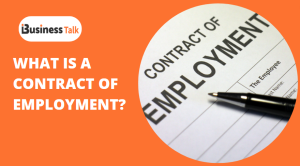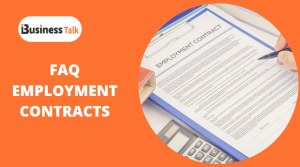
Employment Contracts and Conditions – Legal Advice on Contract of Employment
A contract of employment is a written agreement between an employee or job-seeker and an employer. It lays out the terms of employment, such as job duties, pay, and working environment.
It is commonly used when hiring new employees or extending the employment of existing workers. This contract can cover people working part-time for a company outside of their normal job function or in an organization that is not legally recognized as an employer.
The contract should also contain information about employee benefits and rights (dismissal notice, minimum notice period before dismissal, redundancy pay) that do not normally come with employment contracts. In addition to employment contracts, some employers use employment agreements and letters to regulate employment terms between two parties.
What is a Contract of Employment?

A contract of employment is an agreement between an employer and an employee to provide work. The contract will usually include terms such as wages, hours of work, and job duties. The contract can be oral or written, but it must be in writing to be binding.
Either party can terminate the contract of employment for any reason. If the employee is dismissed without just cause, they may have a claim for wrongful dismissal. Employees are protected by law from discrimination in the workplace. They have a right to unionize if they wish, and employers must keep records of all employees’ wages, hours worked, and other particulars of their employment. If something goes wrong during the course of your employment, you may have a claim for unfair dismissal or discrimination.
Why is a Contract of Employment Important?
A contract of employment is a legally binding agreement between an employer and an employee. The terms and conditions of employment set out in the contract include pay, hours, holidays, sick leave, overtime, and termination of employment. The contract can be amended by mutual consent from both parties. The terms of employment are typically registered with the relevant government authority.
If you are an employee, it’s important to familiarize yourself with your rights and obligations under a contract of employment. If you have concerns or questions about your contract, speaking to an employment contract lawyer is important. Employers should also ensure they comply with all applicable laws relating to the employment contract.
What Should a Contract of Employment Include?

- A contract of employment is a written agreement between a prospective employee and the employer regarding terms and conditions of employment.
- It is advisable to have a contract of employment in duplicate for both parties to ensure accuracy.
- The contract should include information about job title, duties, business rates, hours of work, sick leave, holidays, termination notice period, and other conditions of employment.
- It also includes information about the start and end dates of employment.
- It is important to keep copies of all documents related to the contract of employment in case there are any disputes.
- Always keep a copy of your contract of employment in a safe place in case you need to refer to it in the future.
Employment Contract Law UK
- The terms of an employment contract will depend on the type of contract involved (e.g. fixed-term, permanent, temporary).
- Employment contracts can be verbal or written.
- The parties to an employment contract are the employee, the employer, and any other person who has contributed to the creation of the contract.
- It outlines the terms and conditions of employment and sets out how employment is governed for both parties.
- A key term of every employment contract is terminated for any reason, subject to statutory protections (such as redundancy payments). This means that no matter what happens with your employment, you are entitled to fair treatment from your employer when you leave.
- If you are considering filing a claim in relation to your employment, it’s important to speak to an experienced solicitor. They can help you understand your rights and options under employment law and make sure you have a valid claim. They can also provide legal advice and assistance in negotiating terms and conditions of employment with your employer.
Employment Contract Types UK
It’s important to keep track of your employment status and contact your employer if you want to keep your contract or if your employment status changes. This will help ensure you’re aware of any legal rights and protections that may be available to you.

What is a Zero Hours Contract of Employment?
A zero-hours employment contract is one in which an employer does not guarantee a minimum number of hours of work each week. The employee is required to be available for work at any time and is paid for the work they do even if they are not actually employed. This type of contract can benefit employees who can take on additional work when it becomes available.
However, it can be difficult to negotiate fair working conditions and pay rates under a zero-hours contract. In some cases, employers may require employees to work particular hours or days without guaranteeing them a minimum hourly wage or fixed salary. Thus, it is important for workers to carefully consider the benefits and drawbacks of such contracts before accepting employment.
Zero Hours Contract Employee Rights
A zero-hours contract is an employment contract in which a worker is not guaranteed any minimum hours of work. Under a zero-hours contract, the employer is not obliged to provide a work schedule or roster and typically does not offer any minimum number of hours per week. Instead, the employee is only guaranteed to be assigned to work when required. A zero-hours contract does not entitle the employee to holiday or sick pay nor protects them from unfair dismissal.
Understanding your rights and protections is important if you are an employee in a zero-hours contract. It can be beneficial if you are able to work at times that suit your personal needs and schedule, such as flexibility in the workplace. Besides, if you are able to work fewer hours than expected, you may want to renegotiate your contract with your employer.
Basic Employment Contract
A basic employment contract is a document that sets out the terms and conditions of your working relationship with an employer. The contract can be oral or written but is usually signed by both you and the employer. The main provisions of a basic employment contract include your wages, hours, holiday pay, and sick pay.
It may also include provisions about your right to leave the job, disciplinary action procedures, and confidentiality. A basic employment contract is essential for protecting your rights and interests as an employee. It can help ensure fair and consistent treatment throughout your employment. In addition to a written contract, it is important to have informal agreements about work expectations in place to ensure that all parties are on the same page.
Fixed-Term Employment Contract
A fixed-term employment contract is a type of contract in which the duration of the contract is fixed. In the UK, there are several common uses for fixed-term employment contracts, including reducing the risk of job loss. These contracts are often written in writing and must include details such as the start and end date, pay rates, and working hours.
Either party may terminate a fixed-term employment contract without notice, so it is important to ensure that both parties are comfortable with the terms of the contract. It is also vital that both parties specify what will happen if either party wants to terminate the contract early.
Permanent Employment Contract
A permanent employment contract is a type of contract in which the employee agrees to work for an indefinite period of time. Such agreements can be made at the start of a relationship or at any time after that.
They offer stability and certainty for both the employee and the employer, as it ensures that employees will stay with a company for a set period of time. The main benefits of a permanent employment contract are stability and certainty for both the employee and the employer. It is usually advantageous for companies to have written employment contracts to formalize their relationships with their staff.
Temporary Employment Contract
A temporary employment contract is a type of contract that allows you to hire a person for a specific task or project. These contracts are usually short-term and have no set duration. They can be used for a variety of purposes, such as recruitment, training, or consultancy. The advantage of using a temporary employment contract is that it is flexible and allows you to hire the best person for the job.
This contract allows you to fill a position and save money quickly while ensuring that you hire the right person for the job. It is important to remember that these contracts are not meant to be permanent; they are meant to be used in a particular situation and must be followed up with an employment offer if the project or task has been completed.
Casual Employment Contract
A casual employment contract is a type of contract that is typically used for short-term, temporary work. Casual employees are not given the same rights and protections as full-time employees, and there are a number of benefits to using such a contract. For example, casual employees may save time and money by not having to apply for multiple jobs; they also likely have fewer responsibilities than their full-time counterparts, making it easier to perform their duties.
It is important to carefully read the contract and understand all of the terms before signing it. A casual employment contract can be terminated at any time without notice, so it is vital to understand all of the rights and obligations that are covered in the contract. When working with a contract template, it’s important to take time to read through the terms and make sure that you understand everything that is written.
1 Year Employment Contract
A one-year employment contract is the most common type of contract in the United Kingdom. This contract is typically used when an employer needs to trial a new employee before committing to a longer-term arrangement.
With such a contract, both the employee and the employer can evaluate each other’s capabilities and performance over time, leading to a better decision about whether to continue with the contract. Such contracts are usually written to last for 12 months or less, allowing both parties time to make a decision about whether or not to continue with the arrangement after its completion.
One of the main benefits of using such a contract is that it includes provisions for payment of either fixed or variable salaries, depending on the employee’s progress and performance. Additionally, such contracts often include provisions for payment of bonuses or other benefits such as bonuses and stock market options. These types of contracts benefit both parties involved as they allow them to accurately assess their work roles and expectations without committing to a long-term employment arrangement immediately.
How Long Should I Wait for a Contract of Employment?

- It is advisable to wait at least two weeks after sending a job offer before signing a contract of employment. This will give you enough time to understand the terms and conditions of the offer, discuss any concerns with your prospective employer, and get answers to any questions that may have arisen.
- Do not sign a contract of employment if you do not have the necessary documents or authorization from your employer. Make sure to read the contract of employment carefully before you sign it.
- If you don’t agree with any of the terms in the contract, don’t sign it and negotiate changes with your employer. Never sign a contract of employment that contains unfair terms or conditions.
- It is important to understand what rights and liabilities are attached to a contract of employment before entering into one. You should also be aware of rights during termination of employment, such as the notice period, right to severance pay (if applicable), right to claim unfair dismissal (if applicable), and right to compensation for unfair dismissal (if applicable).
How to Write an Employment Contract?
Writing an employment contract can be a daunting task for many new entrepreneurs. Before you write an employment contract, you should consider the following factors: your company’s size, the type of business you are in, and the number of employees.
The employment contract should include terms such as pay rates, benefits, working hours, Leaves of Absence, and severance pay. It should be written in clear and unambiguous terms so that both parties know what is expected of them. The contract should be signed by both parties and kept in a separate file.
An employment contract could be terminated by either party with 30 days notice in writing or by giving a three-month notice in writing if the employee has completed six months of service with the company.
I Have No Contract of Employment What Are My Rights
If you have no contract of employment, you are an employee at will. This means that your employment with the company is “at will” and can be terminated for any reason without notice or pay. If you are an employee at will, the terms of your contract of employment are not automatically enforceable by law unless they fall into a specific category enumerated in state law (such as minimum wage or overtime). Suppose there is a dispute about the terms of your contract of employment. In that case, it is important to contact either your union representative or legal counsel to discuss the options available to you.
What Happens if I Breach My Employment Contract?

- If you breach your employment contract, you may be liable for damages.
- You may also be able to negotiate a settlement with your employer.
- Your employer may terminate your contract without notice if the breach is severe.
- You may be able to claim constructive discharge if you are fired for refusing to break a contractual duty.
- You may be able to claim unfair dismissal if you are dismissed without just cause.
- You may be able to claim sexual harassment if you are subjected to unwelcome advances or comments in the workplace.
- You may be able to claim race and religious discrimination if you are treated unfairly because of your race or religion.
The repercussions of a breach of contract can be considerable, so it’s essential that you seek legal advice before taking any action of this kind.
Termination of Employment Contract
- Employees have the right to be notified in writing of their termination.
- Employees are entitled to receive notice of the reasons for termination and a copy of the termination letter.
- Employers must provide employees with a written contract of employment outlining their rights and obligations under the contract. The contract should clearly state the period of employment, salary, other benefits, job duties, and any other matters that are particular to employment.
- If an employee is dismissed without just cause, he or she is entitled to fair notice of termination and reasonable compensation if the dismissal was for reasons related to work or employment contracts.
- The employer must comply with any applicable labour laws in connection with the termination of employment. For example, an employee is entitled to notice before being dismissed in case of unfair dismissal under statutory provisions.
Conclusion
There are many different contract types that could be used in employment contracts. The main thing is to understand the contract type you’re using and that of the other party and document them clearly. It’s also vital to include contract terms that reflect the unique requirements of your business and staff. Remember, it’s illegal to breach a contract of employment without good reason, and if you have any questions or concerns, contact employment law experts at our firm.
FAQ – Employment Contracts

Is It a Legal Requirement to Have a Contract of Employment?
Yes, it is a legal requirement to have a contract of employment. A contract of employment is a formal agreement between an employer and an employee. The contract of employment sets out the terms and conditions of the employee’s employment. The contract of employment must be in writing. The contract of employment may be oral or written, but it must be in a form that can be read and understood. The contract of employment is binding on both parties.
What Are the 4 Elements of a Valid Employment Contract?
There are four essential elements to having a valid employment contract: offer, acceptance, consideration, and signature.
- The employer must make the offer and must be genuine. It cannot be vague or inconsiderate.
- The acceptance must be communicated to the employer in a clear and unequivocal manner. It should be unambiguous as to whether or not the employee agrees to the terms of the contract.
- The consideration must be provided in exchange for the employee’s acceptance of the offer. This could be pay, benefits, job responsibilities, or any other form of value.
- Finally, the employee and employer must sign the contract to bind it legally.
How Do I Find My Employment Contract?
The employment contract is a document that should be signed by both you and the employer. The employment contract should be specific to the terms and conditions of your position and written in clear and concise language. The employment contract should also include information about leave policies, pay rates, work hours, and other important provisions.
You should keep the employment contract in a safe place, preferably in a locked file cabinet or safe. If you are terminated from your job, you may be entitled to receive a copy of your termination letter.
What Makes an Employment Contract Invalid?
There are a number of factors that can invalidate an employment contract. Some of the most common reasons an agreement between an employee and an employer may be voided include the following:
- The employee is not qualified for the position.
- The position was not offered to the employee in an equal manner to other employees who applied for the same position.
- The terms of the employment contract are unfair or unreasonable.
- The employee was fired for no reason other than the employment contract terms.
What Are the 3 Basic Employment Rights for a Worker?
The three basic employment rights that every worker should be aware of are the right to fair pay, safe work, and privacy.
When it comes to regular pay, workers have the right to be paid fairly for their services. This means that they must be paid a sufficient wage to meet their family’s basic needs. In addition, workers also deserve overtime pay, holiday pay, and other benefits as per local law or contract.
In terms of safety at work, workers have the right to be provided with a safe workplace free of hazards. This means they must not be injured on the job, and no hazardous materials should be present. Furthermore, employers must provide workers with proper training in order to minimize workplace accidents.
Lastly, workers have the right not to be subjected to unwanted scrutiny or surveillance in the workplace. This means that employers cannot engage in any type of harassment against their employees.
Can I Be Sacked After 6 Months?
Generally, employers have the right to dismiss an employee after a fixed period of time, typically six months. This period will be based on the terms of the employee’s contract of employment. If an employee is dismissed without just cause, they are entitled to compensation, including lost wages and benefits. If an employee is dismissed for cause, the employer may be able to recover damages, such as salary and bonuses that have not been paid.
How Much Notice Do You Give Your Employer?
Employers must give employees at least two weeks’ notice before terminating their employment. However, this notice period may be shortened if there are good reasons for doing so. For example, if an employee is terminated for cause, the notice period would be shortened to one day.
If an employee does not receive the required notice, they have the right to dispute the termination in court.
Can My Employer Change My Contract?
Your contract of employment may be amended by email, letter, or through a collective bargaining agreement. Your contract may also be amended through an email notification if it is an emergency situation.
It is important to keep a copy of all amendments to your contract of employment. This document can help you in proving that you are following the terms and conditions of your contract.
Furthermore, documenting any disputes you have with your employer in written form can help build a case if you ever need to take legal action against your employer.





